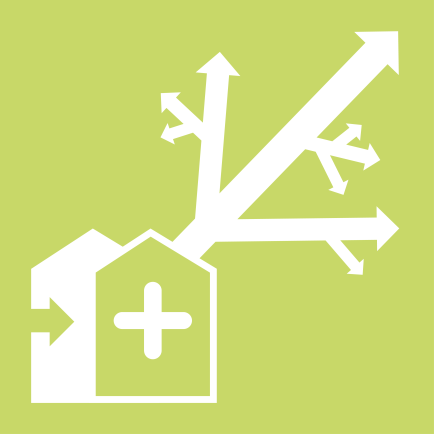Embracing the Uncertainty, Embracing One Another

Embracing the Uncertainty, Embracing One Another
For Judy Amendola, the wait for a new pair of lungs has begun. After a long struggle deciding whether or not to have a lung transplant, she realized the potential benefits of replacing her lungs, scarred by pulmonary fibrosis, outweighed the risks. Due to progression of the disease, she is now on the active transplant list, awaiting donated lungs. Fortunately, her daughter Chloe is at her side, acting as her main caregiver and support.
The hardest part of her role so far, says Chloe, has been learning to embrace uncertainty. “Planning used to be one of my main coping mechanisms,” she says, “and I spent a lot of energy initially trying to plan out what was going to happen. It was exhausting. As soon as I accepted that this wasn’t something I could control with a well-thought-out plan, it changed things for me. I think it has allowed me to redistribute my energy to more productive things, like planning a nice meal for my mom and me.”
Likewise, when her mother became consumed with worry about possible lung transplant complications, Chloe helped her realize she had no control over what might happen. She pointed out that everyone experiences small or large setbacks, such as infection, kidney damage, diabetes, and rejection. And Chloe told her, “Hyper-collecting all the horrible things that could happen is not beneficial. It’s good to know what’s possible but also to accept that you don’t know which of these you’ll have to deal with. A better approach is to face each complication as it comes.”
Judy is lucky to have Chloe, a recent graduate of the Tulane University School of Medicine in New Orleans, as her caregiver. After Chloe completed her studies, she was able to move back to her mother’s home in Cambridge to be with her before and after the transplant surgery. Throughout the process, she’ll provide vital physical and emotional support.
Life After Transplant
Lung transplantation involves what’s known as a clamshell incision—a side-to-side cut across the chest––to gain access to the lung cavity. It also necessitates lots of different lines and tubes and being on a heart-lung machine during the operation. Throughout Judy’s month-long stay in the hospital following the surgery, Chloe plans to bring in comforting items to remind Judy of her home and counteract confusion that may result from the difficult operation, medications, and unfamiliar surroundings.
For the first month after Judy returns home, Chloe or another family member will need to be with her 24 hours a day. As her advocate, Chloe will update the transplant team on Judy’s physical and mental state and come to them with any questions or concerns.
During the first few critical months of recovery, Chloe will monitor her mother’s condition and encourage her to eat well, exercise, and rest. In this period, Judy will not be able to lift anything or drive, so Chloe will take on day-to-day tasks, such as cooking and cleaning, and provide transportation to hospital appointments.
Generally, Judy will have to take it easy, but she will begin to exercise her new lungs by walking. After the surgery, she will take short walks around the hospital unit, and then once at home, she will slowly build up, over a period of months, to walking a mile or two a day.
Initially after the transplant, Chloe will be in charge of managing the anti-rejection medications Judy will need to take. Because these powerful drugs dampen the immune system and increase risk of infection, Judy will have to wear a mask in public and avoid being in large crowds.
Foodborne illnesses, caused by raw or undercooked foods, will also be a threat. Regrettably, that means after the transplant, Judy will have to forsake the raw seafood she loves. But in the meantime, Chloe says, “My mom is eating as many oysters as she can!”
Heart-To-Heart Talks
Knowing they will spend a lot of time together in the future months, Chloe and her mom are working to build mutual understanding. They’ve had numerous in-depth conversations, ranging from household cleaning preferences to how to recognize each other’s stress reactions and not take them personally.
Through these talks, Chloe and Judy have grown closer, which should allow them to cope better with what lies ahead. “Dealing with a terminal disease in a loved one’s life seems to break down walls,” notes Chloe.
Perhaps the most difficult discussion they’ve had is about Judy’s end-of-life wishes. They’ve talked about what life-sustaining treatments she would and wouldn’t want.
“It’s hard and sad,” says Chloe, “but we are trying to find a way to share that and not let emotions build up. I think having these conversations as early as possible and trying to get comfortable with them is really important.”
Chloe is hopeful that a lung transplant will enable her mother to live longer with a better quality of life. But she is realistic, knowing that Judy will face many challenges ahead.
For now, however, it’s a waiting game until the call comes that suitable donor lungs are available. But, fortunately, Judy will have the company of her daughter to ease the wait.